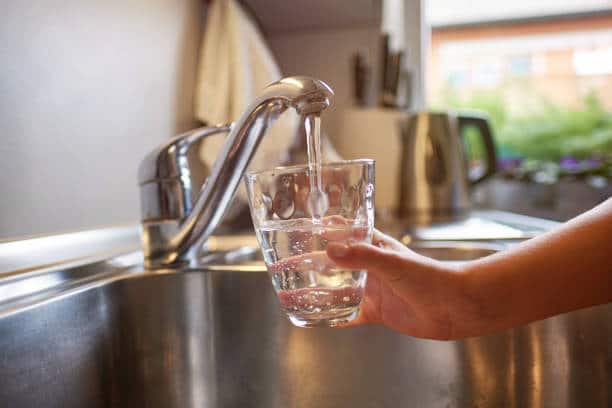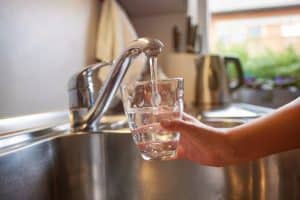With the increasing environmental impact of plastic bottles, many are beginning to question the advantages of tap water over bottled water. Some prefer tap water because it’s safe, tastes better, is affordable, etc. These are some factors that make tap water better than bottled water. Read further as we discuss the difference between tap and bottled water.
Image Source: iStock
Bottled Water vs. Tap Water
What is Bottled Water?
Bottled water, as regulated by the Food and Drug Administration, is water from natural sources such as springs and municipal supplies and undergoes some purification processes like UV treatment to kill bacteria, filtration, etc.
Bottled water contains no chlorine but has added minerals and flavors like fluoride to improve its taste. And are packaged and distributed to retail stores for consumption.
What is Tap Water?
Tap water, as regulated by the Environmental Protection Agency (EPA), refers to water sources from municipal supply and is delivered to homes and buildings. Chlorine and fluoride are added to tap water for purification purposes to make it safe for drinking.
According to EPA, tap water also contains over 90 harmless contaminants that protect human health. And they are cheaper and better consumed in developed countries.
Is Tap Water Mineral Water?
Choosing to drink tap water in your home instead of bottled water isn’t just about the negative impact of the latter on the environment, but the health benefit of the former on you and your family. Tap water contains additional nutrients and minerals such as;
- Sodium
- Magnesium
- Calcium
- Potassium, etc.
These minerals are considered healthy and are responsible for the growth of strong bones and healthy teeth. During water treatment, more chemical disinfectants such as chlorine, chloramine, or chlorine dioxide are added to disinfect germs in the pipes as the water is transported to your home.
Different Bottled Water Brands
Although bottled water isn’t widely accepted, its demand has increased because of its convenience. Some also believe it’s safer than tap water. However, the case may be not all bottled water is produced the same way, and the primary lookout is taste. Moreso, all bottled water sold by different brands in the USA must meet FDA criteria.
Some of these popular brands known to deliver the best are;
- Nestle Pure Life
- Poland Spring
- Aquafina
- Acqua Panna
- Apenta
- Crystal Clear
- Dana
- Dasani
- Energy Brands
- Evian
Bottled Water vs. Tap Water: Similarities Between Tap Water and Bottled Water
Several people prefer bottled water to tap water for safety, purity, taste, and convenience. Some take bottled water to be more ‘premium’ than tap water. However, is that the case? Let’s consider the pros and cons of both water types by looking at some factors.
| Factors (Pros and Cons) | Bottled Water | Tap Water |
|---|---|---|
| Environmental Impact | The processes of bottling, refrigerating, transporting, and disposing of bottled water negatively impact the environment than tap water. | Treated with chemicals and energy to avoid negative impact on the environment. |
| Affordability | Almost 2,000 times the cost of tap water. | Convenient and inexpensive. Simply turn on your faucet and get safe and cool water. |
| Safety | Less safer and healthier | Under stringent regulations and standards, making it safe. |
| Chemical-free | Some bottles are made from polyethylene terephthalate, unleashing chemicals into the water | Contain no toxic chemicals |
| Wastes | Create more plastic bottles, leading to waste. | Prevents the creation of more plastic bottles. |
Why Is Tap Water Better Than Bottled Water
The answer is plausible if you’re curious about why tap water tastes better than bottled water. The key difference between both drinks is their chlorine content; Tap water contains more chlorine than bottled water.
Tap Water is Healthier Than Bottled Water
The truth is that tap water is healthier than bottled water. The risk involved in ingesting bottled water is that you’re exposed to harmful toxins from the plastic bottle.
The chemicals used in making the bottles get into the water over time, releasing toxins that, if digested into the bloodstream, could cause health problems such as cancer. But for tap water, all you need do is turn on your faucet and collect clean and healthy water to drink.
Tap Water is Cheaper Than Bottled Water
Bottled Water vs. Tap Water Price
It is understandable if you live or travel in a country with no portable drinking water. You may have to settle for the available – bottled water. However, if this isn’t the case with you, drinking bottled water vs. tap water is very expensive and isn’t what you want to consider continuously.
Bottled water costs vary depending on the country and brand, but bottled water can be 1000 times more expensive than tap water. For instance, if bottled water costs $1 for each bottle, you would have spent double the amount for a whole year of tap water.
Tap Water Is Safer Than Bottled Water
According to reports, drinking tap water is the safest in the world. The Environmental Protection Agency regulates tap water, while the FDA’s Federal Food, Drug, and Cosmetic Act regulate bottled water. However, 60 to 70% of bottled water isn’t regulated by FDA, making bottled water less safe for drinking.
In addition, since bottled water is under less strict regulation than tap water, it contains bacteria or chemical contaminants like carcinogens. But tap water is considered safer because of daily inspection and contains trace amounts of chlorine that destroy bacteria and germs.
Tap Water Tastes Better Than Bottled Water
In many blind taste tests conducted by Boston University, ABC News, Diet, and Health, UDC Center for Nutrition, and BBC News, it was discovered that tap water tastes far better than bottled water.
Even if some tap water tastes a little more unpleasant than bottled water, it doesn’t mean it’s poor in quality. It’s likely due to the chlorination or higher mineral content. To improve the taste, you can filter the water using a filter or, better still, add ice or a slice of lemon to your portion.
Other Benefits of Tap Water
Filter to Your Standard (50-80WC per h3 section )
In addition, the benefits of tap water are that it can be filtered to your standard. You can always get filter paper to remove specific impurities and soften hard water from your tap, making it safe for drinking.
The water filtration process equally removes microplastics from tap water, leaving you to trust that the water is safe and healthy for consumption.
Chemical Free
Tap water is free of toxic chemicals since it isn’t stored or delivered via plastic bottles capable of unleashing chemicals. When plastic bottles are being reused to store water over time, polyethylene terephthalate (PET) used to make the bottle is released into the water, which is hazardous to health and the environment.
However, since tap water comes directly from the tap, there isn’t such a chemical. And using a high-quality non-rusty faucet makes your water safer and free of any impurities.
More Convenient
When it comes to convenience, turning on your tap and fetching some water to drink is far better than having to source bottled water outside your home. Tap water is readily available without walking into a store, purchasing one, and unscrewing the lid. It becomes even more convenient when you install a high-quality touchless faucet in your kitchen. The touchless faucet makes it seamless and super easy to get water from the tap without touching it. This is awesome!
Tap Water vs. Bottled Water for Plants
Bottled water is costlier than tap water for your household plant. Because plants require lots of water to stay healthy and grow, it will be expensive to spend so much on bottled water which is not readily available, unlike tap water around us. Also, farming tools and equipment need a constant tap water supply to stay clean and ready to use at any time.
Bottom Line: Bottled Water Worse Than Tap Water
The bottom line is that bottled water vs. tap water depends on what a person chooses based on the factors discussed above and their preference. However, bottled water is worse than tap water because of the negative environmental impact of the former, its taste, safety, convenience, and purity – especially since it can’t be filtered.

